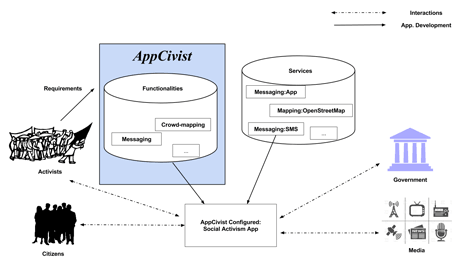by James Holston, Rodrigo Ochigame, and Animesh Pathak
Anthropologists and ICT researchers from France and USA join forces to enable social activists to leverage the tools of the digital revolution.
The increased adoption of mobile devices and social networking mobilizes citizens to monitor their living environment actively. Ultimately this engagement is likely to prompt governments to take action. Therefore, the study of socially-grounded software systems that are dedicated to making cities both smarter and more inclusive holds great potential for cross-domain research among social scientists and computer scientists.
In this context, mobile social networking appears as a significant tool to support social activism within cities. However, the development of information and communication technologies (ICT) for social activism is still in its infancy, ranging from the use of email for internal communication to the Web and social media for mass communication. In terms of integrated platforms, there have been a few initial offerings such as Google Apps for Non Profits. However, Google Apps is a generic platform for organizations and requires significant customization to meet the needs of social activists. At the same time, initiatives like the Social Apps Lab at CITRIS at the University of California, Berkeley, clearly show the potential of mobile devices to generate an active, critical and direct engagement of citizens in social issues, which may increase the impact of social activism.
The AppCivist Vision
AppCivist is a software system being developed by the Social Apps Lab in partnership with Inria, France. It provides a platform for democratic assembly and collective action that lets users make their own applications, called Assemblies, with modular components. An underlying premise of the project is that the development of ICTs for social activism crucially depends on the provision of adequate software tools so that activists can easily assemble applications matching their needs. From a software engineering perspective, architectural principles like service-orientation, coupled with the latest advances in distributed computing, appear as relevant base building blocks. From the social science perspective, social activism relies on a number of key functionalities that may be leveraged and re-used effectively across applications. Such functionalities include the following, among others:
- Proposing, deliberating, and voting allow citizens to have meaningful discussions based on available information, leading to action. While simple plurality-based voting systems exist, they fail to enable the nuanced discussion, filtering, consideration, and consensus-building that is fundamental to both social activism and democratic citizenship.
- Collaborative mapping helps people crowd-source the creation of custom maps that display phenomena of their interest. The Social Apps Lab has already successfully deployed this functionality as part of the Dengue Torpedo project in the favelas of Rio de Janeiro, Brazil.
- Data visualization enables non-specialist users to gather and convert information quickly into easily-consumable graphics and reports for wide dissemination.
- Mobilizing citizens encourages people to specify what needs to be done and to get involved. AppCivist helps users raise issues, propose solutions, and evaluate proposals. As activism depends on follow-through, it also tracks the progress of activities, allows citizens to collaborate, and rewards those who participate.
- Linkage with media and administration enables activists to report issues to those in power and to track their resolution.
These functionalities encourage proposal-making that is more directly democratic and enable people to make better arguments for their proposals. Making better arguments is key to advancing democratic deliberation. At the same time, the field of social activism brings unique challenges to service-oriented computing in particular and to ICT in general, including the following:
- Focus on Usability. Since the users of AppCivist are not expected to be ICT experts or “digital natives”, it is imperative that the use of the platform’s modular functionalities be intuitive. The same applies to the administration of plug-and-play and interdependent individual services.
- Cost-sensitivity. The platform should accommodate the vastly different budgets of activist organizations. Consequently, it should carefully consider the use of costly services such as SMS gateways and incorporate ways to define and manage budgets.
- Privacy. Since activist organizations and their members may have significant security issues, AppCivist must provide strong guarantees regarding the privacy of the data and identity of users.
- Accountability. Nevertheless, certain activities (such as proposing and deliberating) may require that people be accountable for their inputs. Therefore, AppCivist should also provide strong guarantees for non-repudiation, where needed.
- Inclusiveness. We do not want the use of AppCivist to lead to exclusion - something that can happen, for example, if the platform restricts access to messaging to those with smartphones. Consequently, the platform should enable heterogeneity in different dimensions of communication, such as language, technology, and so forth.
Next Steps: Enabling Rapid Integration of ICT in Social Activism
In view of the above, the objective of our research is to study, from design to prototype implementation, a service-oriented architecture and supporting platform aimed at facilitating the assembly of applications by social activists. Jointly performed at Inria and the Social Apps Lab at the University of California, Berkeley, this research will also involve close consultation with activists.

As illustrated in Figure 1, the development of the core platform and associated services for social activism will include algorithms and protocols for filtering and voting, data visualization, assembly of modular components, real-time multi-platform communication between activists and among the general public, mobile-based crowd-sourcing/sensing, and dynamic task-allocation and management among participants. Further, the interplay between mobile and cloud computing entails assessing both cost and social effectiveness.
Links:
Social Apps Lab at CITRIS: http://socialappslab.com/
CityLab@Inria Project Lab on Smart Cities: http://citylab.inria.fr/
References:
[1] J Holston: “Insurgent Citizenship: Disjunctions of Democracy and Modernity in Brazil”, Princeton University Press, 2008.
[2] A. Toninelli, A. Pathak, V. Issarny: “Yarta: A Middleware for Managing Mobile Social Ecosystems”, GPC 2011.
Please contact:
James Holston
University of California, Berkeley, USA
E-mail:
Animesh Pathak
Inria, France
E-mail:











